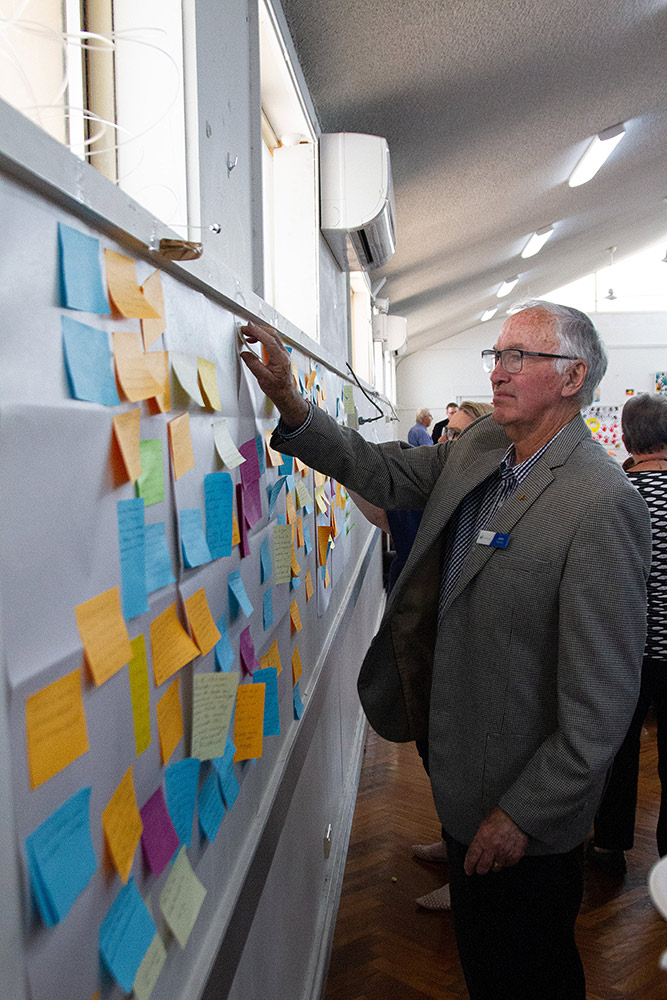Listen to what the Spirit is saying
August 14, 2019
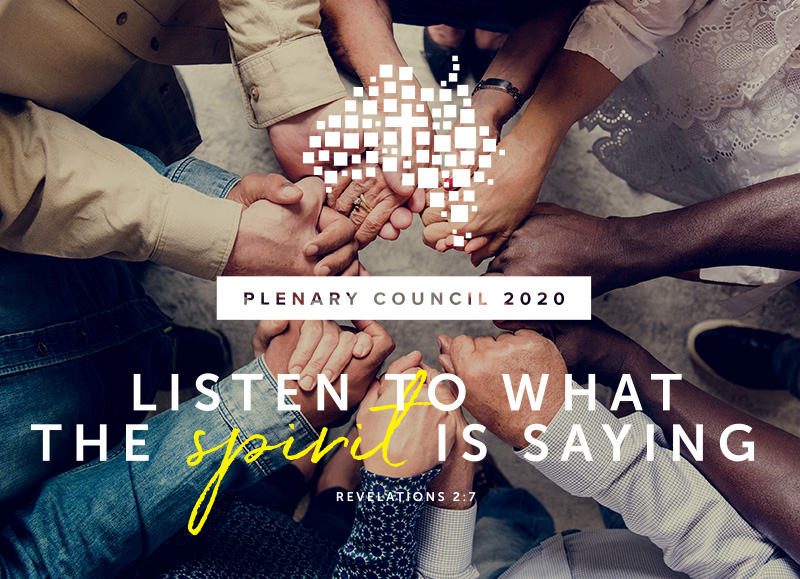 In October 2020, the Catholic Church in Australia will gather for the first plenary council to be held since the Second Vatican Council. From August 2018 to March 2019, our diocese, with the entire people of God in Australia, began preparing for this historic moment by listening to God through listening to one another’s stories of faith. In that time, more than 222,000 people participated in individual or group listening and dialogue encounters.
In October 2020, the Catholic Church in Australia will gather for the first plenary council to be held since the Second Vatican Council. From August 2018 to March 2019, our diocese, with the entire people of God in Australia, began preparing for this historic moment by listening to God through listening to one another’s stories of faith. In that time, more than 222,000 people participated in individual or group listening and dialogue encounters.
In our diocese, over 120 local animators in parishes, school and agencies led processes that enabled prayerful consideration, humble listening and bold speaking. This culminated in the Diocese of Wollongong contributing 1,451 submissions of the overall 17,000 received from the 33 dioceses across Australia—all faithfully passed on to the National Centre for Pastoral Research (NCPR) for consideration in the development of key themes for the next phase of discernment.
The diocesan listening process endeavoured to provide a variety of opportunities including individual online submissions and group processes in parishes, schools and CatholicCare; each of these arms of the Church reaching out to those in their sphere of influence as well as those disconnected from our worshipping communities. The local animators not only organised the dialogue processes; they were also tasked with listening in the context of their own communities and faithfully distilling what they heard into succinct face-to-face presentations and written submissions for Bishop Brian Mascord at four regional listening days. On the completion of this listening process, Bishop Brian provided his initial feedback at our 30 March 2019 diocesan plenary gathering—expressing great gratitude for all he had heard.
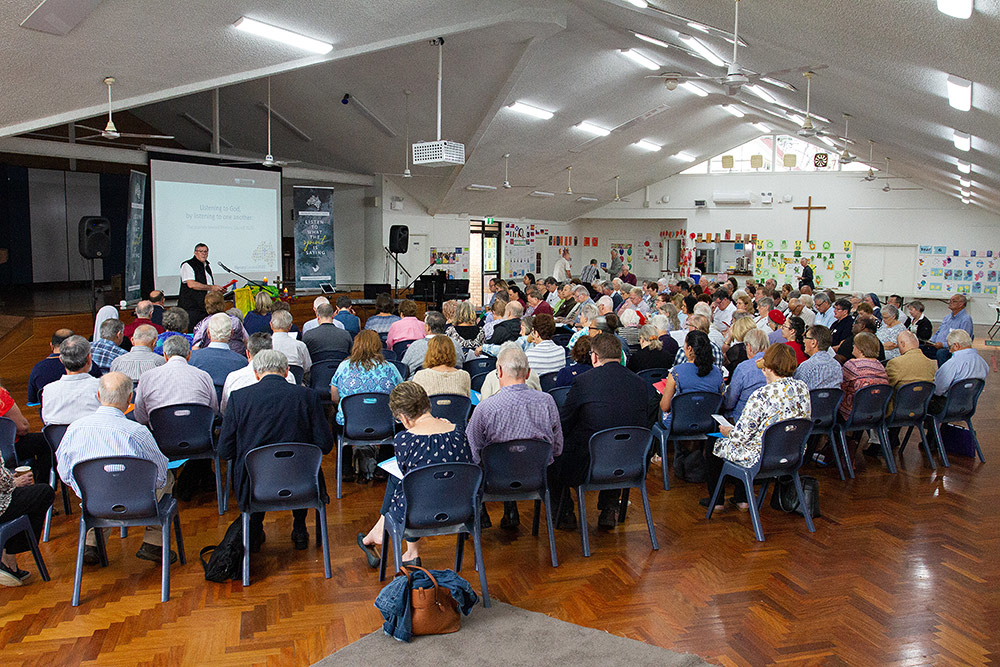
From my perspective, it was a humbling privilege to have sat through the presentations made by our local animators with other members of the bishop’s Plenary Council Steering Committee over a series of weekends. In doing so, the members of the steering committee—Trish Cooney (CatholicCare), Ken Bryant (Catholic Education Diocese of Wollongong), John Tubridy (diocesan Plenary Council 2020 project officer) and myself—along with Bishop Brian, heard stories of hope, lament, hurt, healing and belonging, and the fervent desire for the Church to become, more clearly, the body of Christ on earth.
The practical insights and suggestions associated with this feedback were broad, and at times, contradictory. A great deal of what was heard was joyful and inspiring, and other feedback was hard-hitting and confronting. Still, all of it was received sincerely and humbly with the hope of giving voice to the promptings of the Holy Spirit.
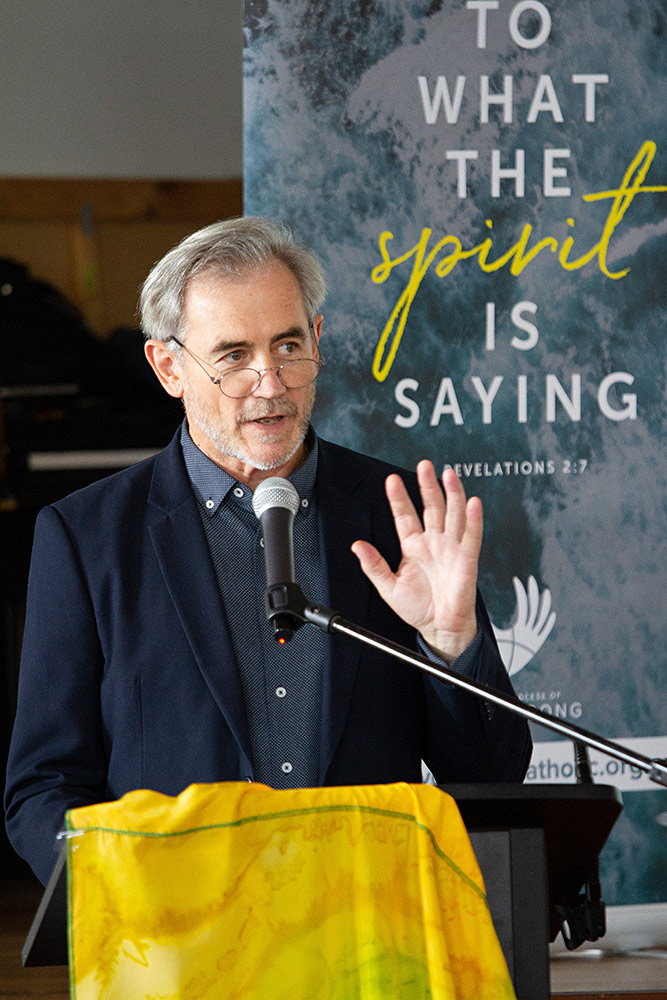 A snapshot of what was heard in the diocese
A snapshot of what was heard in the diocese
A future full of hope and renewal
Whilst living in tumultuous times, local animators nevertheless spoke of encountering much joy and encouragement: Discussion is happening; dialogue is being heard; lives are being changed. From all parts of the diocese, hope emerged that our Church can be renewed so that we may continue to become truly missional in the example of Christ.
Personal renewal and encounter with Jesus
Many expressed that such renewal comes through a deeper encounter with Jesus and each other. Whether children, youth, middle-aged or elderly, feedback gave evidence of this desire for the cultivation of a deeper, relational quality in our faith. Such an encounter emerges through proclaiming the basic Gospel message—Jesus died for us, rose again and desires relationship to be with us always. Thus, in seeking to foster greater connection, we must find new ways to evangelise and reach out to those disconnected from our worshipping communities.
Our sacramental life
Taking our sacramental life “to the next level” was a desire shared by many participants.
It was variously expressed that if our sacramental life, especially the celebration of the Eucharist, is truly the source and summit of our worship, then we must ensure it is truly demonstrated. This requires giving attention to the quality of our worship and requires preparation, resourcing, training, time and talent.
Furthermore, the need for quality music was repeatedly mentioned—regardless of the era or style. There were very strong references to the need for more contemporary styles of music in our worship with language that was easy to understand, affirming our beliefs, and inviting us to a deeper personal walk with God.
Similarly, the quality of preaching was named as a vital feature of worship and necessary for the formation of missionary disciples. The desire to be nurtured and challenged by a fervent message—well prepared, well delivered, with relevant and usable take-home content—was often communicated.
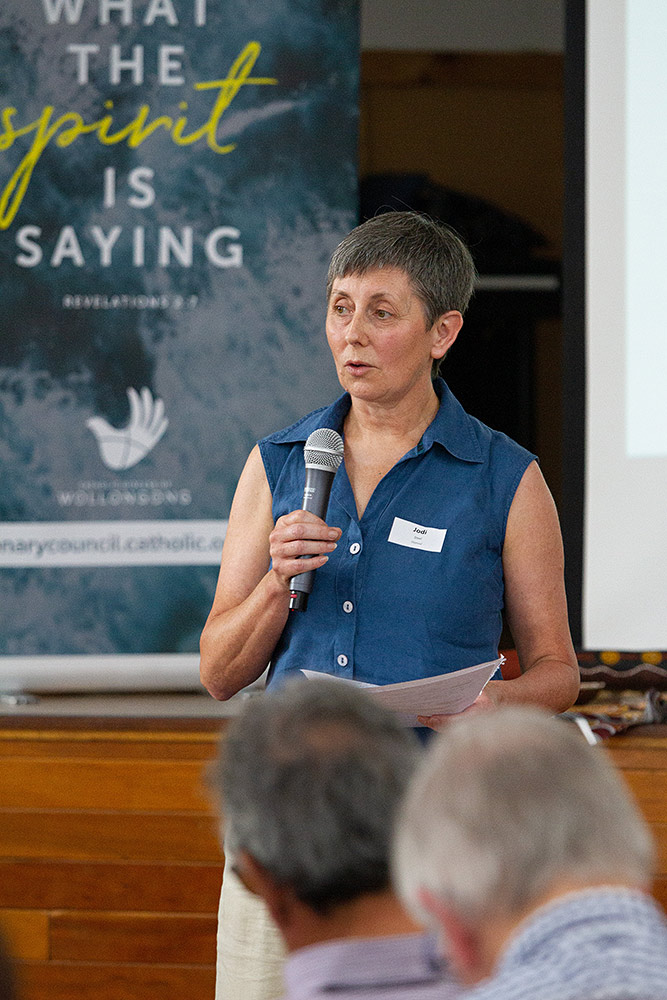 Courage in governance and leadership
Courage in governance and leadership
Drawing upon all our gifts for ministry and mission was a key component of much feedback. There was a strong desire for deep consideration of governance, accountability and transparency within the Church, ensuring that all people, especially women, were involved in meaningful ways in all levels of decision making. Many spoke of the desire for real co-responsibility at all levels of the Church that encourages and cherishes the gifts and leadership of our laity.
Concern for our clergy
So much of what was said during the listening sessions focussed on the important role played by clergy. Many noted concerns for our clergy and the declining numbers of priests. A deep love for clergy was expressed, openly and overtly, for the central role they play in our lives and journey of faith.
Contributors wished for our clergy to be joyful and thriving. There was a deep desire for clergy to be well supported, well formed, and to complement the collaborative visions for renewal our Church needs alongside trusted, capable laity—both paid and volunteer. There was a repeated call to free-up the clergy from tasks that hinder them from their core work to make missionary disciples, teach, provide pastoral care, and build vibrant faith communities.
Welcome and inclusion
While many of our parishes do well at welcome and inclusion, it was recognised that a significant number still appear to struggle in this area. Parishioners and visitors are often anonymous attendees who do not feel strongly connected to each other as a faith community. The important place of small groups in the context of big parishes was repeatedly referenced in order to build connections in a nurturing community. There was widespread agreement that a mission-focused Church should pay particular attention to reaching out and deliberately inviting the disconnected and marginalised into our faith communities.
The importance of authentic Catholic witness and teaching in Catholic schools was regularly referred to as essential in this element of renewal, as was ensuring a strong partnership with shared mission focus between parishes and schools.
Healing the hurt
During the sessions, we heard much about the need for collective healing and the ongoing disillusionment and anger associated with child sexual abuse. There was a strong desire for an apology that is humble, heartfelt, just and public. There was a deep sense of shame and recognition that rebuilding trust will require authenticity, sound professional standards formation, and for many, the passage of time.
Process and listening
One of the great fruits of phase one of Plenary Council 2020 was the listening process itself, which was widely regarded as a blessing—pointing strongly to a Church where co-responsibility is enthusiastically embraced and the gifts of the laity are released for the service of the Church.
What happens next?
The process of discernment
The responses from the Diocese of Wollongong and those from all around Australia were received by the NCPR, considered and reviewed, and have culminated in the development of six broad themes:
How is God calling us to be a Christ-centred Church in Australia that is:
- Missionary and evangelising?
- Inclusive, participatory and synodal?
- Prayerful and Eucharistic?
- Humble, healing and merciful?
- A joyful, hope-filled and servant community?
- Open to conversion, renewal and reform?
People in faith communities across Australia, including the Diocese of Wollongong, will be called to participate locally in their own communal listening and discernment encounters, with local animators again invited to draw their local communities into these processes. Applications for membership of national working groups for each theme will open in September, and the fruits of what is discerned during this time will shape the agenda of the first session of the plenary council in October 2020. Please visit www.plenarycouncil.catholic.org.au for more information as it becomes available.
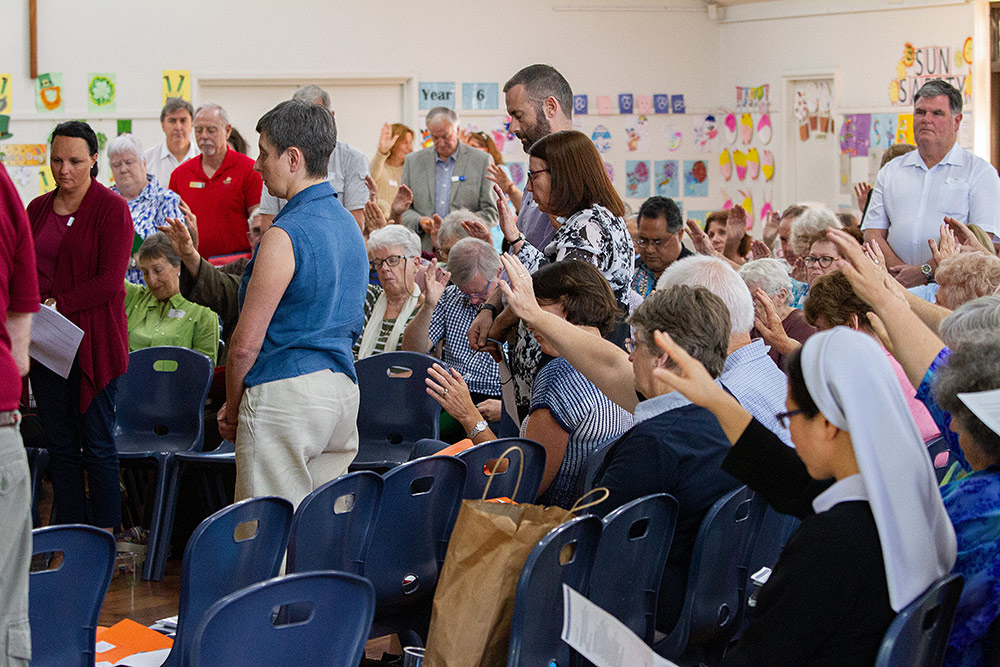 On behalf of Bishop Brian, I sincerely thank everyone across the diocese who has been part of the Plenary Council 2020 process thus far, particularly our local animators and John Tubridy who have each been tasked with the processes of enabling good listening and discernment in our diocese. The six themes that have developed out of this are rich in content and reflective of a broad range of perspectives. Rightfully, we are now called to meticulously and prayerfully discern together with great care, wisdom and knowledge.
On behalf of Bishop Brian, I sincerely thank everyone across the diocese who has been part of the Plenary Council 2020 process thus far, particularly our local animators and John Tubridy who have each been tasked with the processes of enabling good listening and discernment in our diocese. The six themes that have developed out of this are rich in content and reflective of a broad range of perspectives. Rightfully, we are now called to meticulously and prayerfully discern together with great care, wisdom and knowledge.
Thus, as we move into this second phase of preparation for Plenary Council 2020, we will need to continue to seek the wisdom of the Holy Spirit, spend further time listening to God and each other, and continue to decipher what has been heard through the lenses of Scripture, tradition and the magisterium.
Jude Hennessy is the director of the Office of Renewal and Evangelisation in the Diocese of Wollongong.
This article first appeared in Journey Magazine Winter 2019. Click here to read the whole magazine.
Go back
